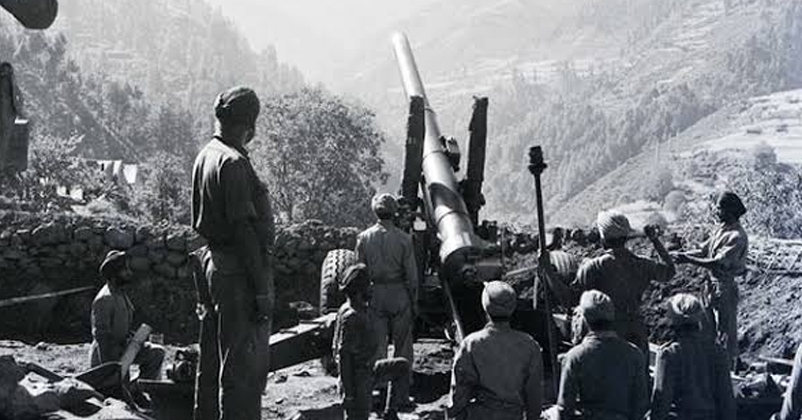Indo-Pak wars and major operations
- Indo-Pak War of 1947-48 (First Kashmir War):
Year: 1947-1948
Context: The war took place immediately after the partition of India in 1947.
War Participants: Indian Armed Forces and Pakistani forces supported by Tribal Militias.
Cause: The conflict arose over the princely state of Jammu and Kashmir, which had a Muslim majority population ruled by a Hindu Maharaja.
War Description: Pakistani forces, backed by tribal militias, invaded Kashmir, prompting the ruler of Kashmir to seek military assistance from India. The war involved ground battles in the Kashmir region.
War Conclusion: The war concluded in 1948 with a UN-brokered ceasefire. Pakistan remained in control of a portion of Kashmir, which is commonly referred to as Pakistan Occupied Kashmir (POK) by India and the United Nations. The rest of the region came under Indian control.
Nations favoring India: The Indian government received diplomatic and moral support from the United States, the United Kingdom, and the Commonwealth nations.
Nations favoring Pakistan: Pakistan received support from Muslim-majority countries such as Iran and Turkey, who expressed solidarity with Pakistan's cause.
Vijay Diwas: October 27th, 1948 - Indo-Pak War of 1965 (Second Kashmir War):
- Year: 1965
- Context: Tensions escalated over the disputed region of Kashmir.
- War Participants: Indian Armed Forces and Pakistani Armed Forces.
- Cause: Pakistan launched an infiltration and military operation across the ceasefire line, leading to a full-scale war.
- War Description: After the infiltration and military operation by Pakistan, India launched counter military operation. The war involved ground battles, air strikes, and naval engagements.
- War Conclusion: The war ended in a stalemate with a ceasefire agreement brokered by the Soviet Union (Present day Russia, Ukraine, Belarus, Kazakhstan, Uzbekistan, Azerbaijan, Turkmenistan, Georgia, Armenia, Moldova, Kyrgyzstan, Tajikistan). The pre-war boundaries were largely restored, and both countries returned to their respective positions.
- Nations favoring India: During this war, India received support from the Soviet Union, which provided diplomatic backing to India.
- Nations favoring Pakistan: Pakistan enjoyed support from the United States and several Western nations who saw Pakistan as an important ally during the Cold War.
- Vijay Diwas: September 22, 1965
Indo-Pak War of 1971 (Bangladesh Liberation War):
The Epic Surrender of 93,000 Pakistani troops to India and Mukti Bahini - Year: 1971
- Context: The war took place during the Bangladesh Liberation War.
- War Participants: Indian Armed Forces and Pakistani Armed Forces.
- Cause: The conflict erupted after the Pakistani military cracked down on the Bengali nationalist movement in East Pakistan (now Bangladesh).
- War Description: India provided support to the Bengali rebels, leading to a full-scale war. The war involved ground battles, air strikes, and naval operations.
- War Conclusion: The war concluded with the surrender of Pakistani forces in December 1971. As a result, East Pakistan became the independent nation of Bangladesh.
- Nations favoring India: India received significant support from the Soviet Union, which extended diplomatic, military, and logistical assistance to India during the conflict. The Mukti Bahini, the Bengali resistance fighters, also received support from India.
The Soviet Navy dispatched warships to the Indian Ocean, which acted as a deterrent to any potential interference from other countries. The presence of Soviet naval assets helped secure India's maritime interests. - Nations favoring Pakistan: Pakistan received support from the United States and China, who were concerned about the Soviet Union's growing influence in the region. Other Muslim-majority nations also expressed solidarity with Pakistan.
- Vijay Diwas: December 16, 1971
Kargil War of 1999 (Operation Vijay):
Year: 1999
Context: The conflict took place in the Kargil district of Indian-administered Kashmir.
War Participants: Indian Armed Forces and Pakistani Armed Forces.
Cause: Pakistani troops, disguised as militants, infiltrated Indian territory and occupied strategic positions along the Line of Control (LoC).
War Description: The Indian Army launched a military campaign to evict the Pakistani forces. The war involved intense fighting in mountainous terrain, including ground battles and airstrikes.
War Conclusion: The conflict ended with India reclaiming its lost territories after a successful military operation. Pakistan was compelled to withdraw its forces to the pre-war positions.Nations favoring India: It is said that in Kargil war, the Western nations extended diplomatic support to India, by pressurizing Pakistan to leave LoC and gain a peaceful resolution, but diplomatic support was not helpful for India and hence, India attempted a full-fledged Military Operation named as Operation VIJAY. India was helped militarily by the Russia.Nations favoring Pakistan: Pakistan received diplomatic support from China, which called for a peaceful resolution to the conflict. Some Muslim-majority nations also expressed support for Pakistan during this war.Vijay Diwas: July 26, 1999








![[FREE PDF] Situation Reaction Test | Psych tests at SSB | 150 SRT Problems](https://blogger.googleusercontent.com/img/b/R29vZ2xl/AVvXsEjVlBQb9_dfKlftvESKgmwROM9daafVjAOJPs1tcMbNdUXoWZz3X9U69okZxsWEu0GoNg02dCTfKvQTszYBUP2WUK8_IFCvgny62AYbxz_Uuc_aLs6mr-_9YdxJaFQJAE0agw_SUlhvRkzMEZGcf0eYghvbIOpxUxjfibBa91tkBHmsWtBqx6Mlx8pB_wY/w72-h72-p-k-no-nu/image.png)
![[FREE PDF] OIR Practice Set - 1 | Officer Intelligence Rating Test](https://blogger.googleusercontent.com/img/b/R29vZ2xl/AVvXsEjLB7ZjV3JgCqyZhJvzDEtDG_1XYECy4Ge17ReprORHqdAqijGsc-oLLfTxjaGljVhVcACM6-aIJtkMCONnHQFvsJp9-ZmIU8FLeZ-9d0X6CwimwY2F33B2BvrYZ3-OoLKmWjG5wPjUqEFi2clNFM8RQMss0aJ2iFN8KJMHcutuVSuNKO_JonjXyRDRttM/w72-h72-p-k-no-nu/Black%20and%20Yellow%20Modern%20Black%20Friday%20Sale%20Mobile%20Banner%20Ad%20(4).png)




![[FREE PDF] Situation Reaction Test | Psych tests at SSB | 150 SRT Problems](https://blogger.googleusercontent.com/img/b/R29vZ2xl/AVvXsEjVlBQb9_dfKlftvESKgmwROM9daafVjAOJPs1tcMbNdUXoWZz3X9U69okZxsWEu0GoNg02dCTfKvQTszYBUP2WUK8_IFCvgny62AYbxz_Uuc_aLs6mr-_9YdxJaFQJAE0agw_SUlhvRkzMEZGcf0eYghvbIOpxUxjfibBa91tkBHmsWtBqx6Mlx8pB_wY/w100/image.png)
![[FREE PDF] OIR Practice Set - 1 | Officer Intelligence Rating Test](https://blogger.googleusercontent.com/img/b/R29vZ2xl/AVvXsEjLB7ZjV3JgCqyZhJvzDEtDG_1XYECy4Ge17ReprORHqdAqijGsc-oLLfTxjaGljVhVcACM6-aIJtkMCONnHQFvsJp9-ZmIU8FLeZ-9d0X6CwimwY2F33B2BvrYZ3-OoLKmWjG5wPjUqEFi2clNFM8RQMss0aJ2iFN8KJMHcutuVSuNKO_JonjXyRDRttM/w100/Black%20and%20Yellow%20Modern%20Black%20Friday%20Sale%20Mobile%20Banner%20Ad%20(4).png)




0 Comments